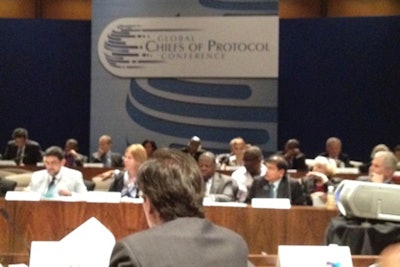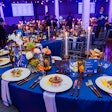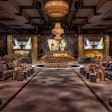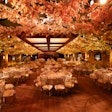
On the July 4 holiday, a day full of American traditions, the U.S. State Department hoped to begin a new one with the inaugural Global Chiefs of Protocol Conference. The event, July 4-6, drew more than 100 representatives from 87 countries and five international organizations to talk about the role of protocol in diplomacy and delve into the details of gift-giving, hosting international dignitaries, and decor and event design.
The conference kicked off with a viewing of the Independence Day fireworks from the Secretaries of State terrace at the State Department. Hillary Rodham Clinton greeted the guests, and former President Bill Clinton attended. The programming for the conference began the following day.
"We are hosts to history, and we are honored and humbled by this responsibility," said Ambassador Capricia Penavic Marshall, U.S. chief of protocol, at the opening session.
The event coincided with the 50th anniversary of the Vienna Convention on Diplomatic Relations. Since that milestone, protocol professionals had shared ideas and best practices informally, but not at a formal, large-scale gathering.
“The art of protocol has evolved over time,” Marshall told attendees. “We are here today to begin a conversation about that art: where it has been, where it is now, and where it should go."
Protocol chiefs also are keepers of tradition, yet Marshall said the field is not immune to trends or innovation from the event industry.
“We seek out innovative, interesting people who can weave within the traditional setting and expectations of both our food and decor a new influence,” Marshall told BizBash. “We have revamped our offerings to include food that is regional, organic, and sustainable. As well, we seek out ways to infuse the wonderful flavorings and styles of our visiting dignitaries. Equally, we look for new presentations of table and room decor and style.” [BizBash C.E.O. David Adler has an advisory role with the Office of Protocol.]
The details, perhaps more than at most events, truly matter. The high-profile events that chiefs of protocol plan can make international news—both good and bad. “We need to take care to apply appropriate protocol procedures and research whether a color or presentation does not have a negative connotation to a visiting dignitary," Marshall said.
Seating also is crucial, as any host knows. A complicated system of rules called “precedence order” establishes the order of seating at all formal events and ensures that no head of state or delegation feels slighted by seat location or departure time.
For the panel on decor and event design, Marshall was joined by chef Jose Andrés and Bryan Rafanelli of Rafanelli Events. Andrés discussed how sharing a meal can advance diplomacy and bridge cultures. Andrés, along with his team from America Eats Tavern, also designed the menu for the conference luncheon, which featured items significant to America’s culinary history. They included a welcome cocktail of milk punch using a 1763 recipe from Benjamin Franklin, shrimp in grapefruit cocktail from the first edition of the classic Joy of Cooking, barbecue beef short ribs with “cold slaw” that celebrated barbecuing traditions that slaves brought to the southern states, and a dessert of key lime pie.
Plans already are under way for a follow-up event. But that’s not to say this group was patting each other on the back.
“Protocol is a thankless job,” said United Nations chief of protocol Yeocheol Yoon of the Republic of Korea. “In the United States, if something goes wrong, you look for your lawyer. In the diplomatic world you look for protocol to clean up the mess or sometimes to take the blame. There is rarely a moment for compliments or credits, but so many critics are there looking for our mistakes. Only when there is no complaint up to the end, we whisper among ourselves with a sigh of relief that we were perfect.”



















